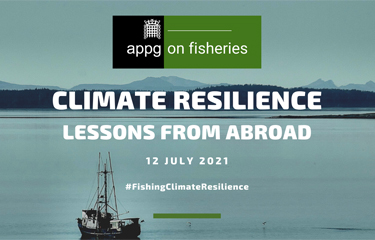Building climate resilience will be essential to the United Kingdom's seafood indsutry if it hopes to maintain production and account for impendeing changes, speakers from around the world told the U.K. government’s All Party Parliamentary Group on Fisheries at its most recent meeting.
The panel, which is operated by the U.K.’s Fisheries Secretariat, is a cross-party body focused on issues affecting the U.K. fishing and seafood sector. The aim of its recent session was to gain insight into how to tackle issues resulting from climate change that could impact the country’s fishing industry in the future.
Building climate resilience into the world’s fisheries, and the coastal communities that rely on them, is vital if those communities are to survive the unprecedented changes in weather patterns and sea temperatures caused by climate change, the panel heard from experts. Rising sea temperatures are shifting the distributions and abundance of commercial fish stocks and other marine species, shifts forecasted to cause increasingly dire problems for fishers if local and international fisheries management regimes do not have inbuilt flexibility to account for such changes. Fishers are also encountering stormier seas, while rising sea levels are threatening to destroy their homes.
In order to build resilience, scientists need to predict future changes in order to account for them, so that plans can be put into place to help fishermen and communities to cope, according to Merrick Burden, the senior director for resilient fisheries and lead senior economist at the Environmental Defense Fund (EDF). Accurate modeling is key to achieving this, Burden told the panel.
EDF has identified five guiding principles for building climate-resilient fisheries: sound management and governance, planning for change, enhanced cooperation across borders, improvements to and restoration of ecosystem health, and fairness and equity.
“Science-based management improves fishery performance. Science shows changes, and management based on that science allows adaptation to the changes. In places where sound fishery management is not yet in place, it should continue to be the goal,” Burden said.
Burden outlined the work the EDF is doing in Myanmar, where due to ineffective management the highest risk to fisheries is currently illegal fishing. However, when climate change is incorporated into a risk analysis, a different result emerges, with erosion showing an extreme relative-risk score.
Sarah Harper, a postdoctoral researcher wwith the University of Victoria in British Columbia, Canada, explained how her province is working towards climate-ready fisheries on Canada’s west coast through collaboration, and partnerships between NGOs, government, industry, and academia.
“Much of the west coast of Canada is a temperate rainforest and had not been as adversely affected by temperature rises as other regions,” she said. “However, we had a wake-up call this summer when a heat wave swept across the province, and the temperature reached 49.6 degrees Celsius in one town. The extremes of heat coincided with very low tides, which impacted severely on intertidal marine life and will no doubt have a knock-on effect on fisheries. This makes our work even more important.”
Kathy Mills, a research scientists at the Gulf of Maine Research Institute in Portland, Maine, told the panel how climate resilience was being tackled in the U.S. state of Maine through a participatory approach that includes fishermen, processors, and traders. The lobster fishery in Maine has been the most-valuable fishery in the U.S. since 2014, and accounts for 80 percent of the landed value of all fisheries in the state.
“An extreme heatwave in the northwest Atlantic in 2012 first put climate change onto the radar for the lobster fishery, when the warmth in the ocean created a shift in the annual cycle, and lobsters moved inshore earlier. This created huge challenges for the supply chain because it overlapped with the Canadian fishing season, so dealers and processors were not set up to handle an additional several million pounds of lobster at that time,” she said.
The result was a market collapse, which sent prices tumbling to some of the lowest levels the fishery has ever experienced, Mills said.
“We learned fast from that experience, and the entire supply chain made changes to make it more resilient to future heatwaves. We experienced similar patterns in 2016, 2018, and 2020 but the adaptations put in place enabled industry to cope and the prices to hold,” she said.
Adaptations included fishermen gearing up to handle and store their product early, an expansion of processing capacity in Maine, dealers prepared for variability in timing and handling of the lobster, and marketing initiatives to expand potential and create flexibility, Mills said.
Alistair Hobday, the research director and senior principal research scientist at Commonwealth Scientific and Industrial Research Organisation (CSIRO) in Australia, emphasized to the panel how predictive models can be used to proactively account for future changes to stock distribution and abundance, and explained how they are being used in Australia’s fisheries management regime.
“We need to use forecasts to understand potential future conditions and to manage fish as if those conditions were already here,” he said.
Development of the transnational Observation, Prediction, and Early Warning System (SAPO) – which is being co-designed by Chile, Peru, and Ecuador – was the theme of a presentation from Rubén Pinochet, Undersecretary of Fisheries and Aquaculture in Chile. Pinochet explained how this new tool is helping to inform adaptive management of the South American fisheries in the Humboldt Current.
Sheryll Murray, a member of U.K. Parliament and chair of the APPG, concluded the event provided “an excellent opportunity to reflect on the similarities and differences between fisheries around the world and the industry in the U.K.”
“The event provided plenty of food for thought about how we can build climate resilience into our own fisheries and their associated coastal communities," she said.







